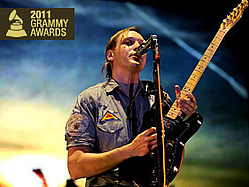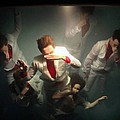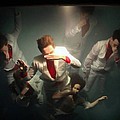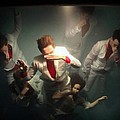LOS ANGELES — It wasn't the Grammys, and it wasn't supposed to be.
On Friday night, far away from the machinations of the music industry and the glad-handling of golden gramophones, in a grand old theater that now doubles as the Ukrainian Culture Center of Greater Los Angeles, Arcade Fire — the indie band who, at Sunday's 53rd Grammy Awards, will face off against the likes of Eminem and Lady Gaga for Album of the Year — threw what will probably go down as the week's greatest un-official, anti-Grammy pre-party: a sweaty, exuberant, all-ages secret show that felt about a million miles removed from the award-show hysteria that has descended on much of the city.
Only 500 tickets were sold, in a first-come, first-serve basis at three locations (a pair of record stores and the venerable El Rey Theatre) on Friday afternoon. There was no red carpet outside or a VIP area inside, just the still-elaborate eaves of an 86-year-old building now crumbling away on a decidedly gritty stretch of Melrose Avenue. The band gave away "free drinks and cotton candy" before the show even began.
It was, in short, an anti-industry affair in all conceivable ways, and Arcade Fire savored every second of it.
As the strains of Julie Andrews' "Lusty Month of May" crackled over the speakers, the Canadian band's members took to the tiny stage, grinned and then, appropriately enough, blasted headlong into "Month of May," from their Grammy-nominated The Suburbs, with frontman Win Butler cocking his head and jutting his guitar out into the crowd — who, being so close, gladly reached out and grabbed it. Given that they were playing at full strength — eight in all, sawing and hammering away on a menagerie of violins and keyboards and drums and guitars — and that, for much of the past decade, they've been tailoring their sonics to massive festival crowds and cavernous indoor spaces, the sound they produced in this little theater was enormous; it washed over the audience, all the way to the back of the building, and then up to the arched ceilings. And that only added to the euphoria.
Because there truly is something to be said about seeing a band this big in a venue this small. Already-massive songs like "Rebellion (Lies)" and "Neighborhood #2 (Laika)" became even larger, the bass rumbled and the strings stabbed, the chanted vocals of Régine Chassagne and Richard Reed Perry broke through and grabbed at you. At one point, even Butler noticed, because he proudly proclaimed this to be the most out-of-control show ever," and then tore the roof off the place with a thunderous take on "No Cars Go," which saw the band going six-wide on vocal harmonies.
They added extra oomph to songs both old ("In the Backseat," which slowly, gloriously hemorrhaged to a close; "Neighborhood #3 (Power Out)," which fell and then rose again on Butler's wiry guitar work) and new (an elastic take on "We Used To Wait," all handclaps and crescendos; a muscled, loose run through "Ready to Start") and played the rest with their trademarked madcap abandon which, given the size of the room, only appeared more madcap. And that intimacy was the key, whether it was when Butler waded out into the crowd during the encore or when he looked out into the outstretched hands, sighed, and said, "We can't tell you how good for the spirit it is to play a small show like this."
And he meant it. But it was equally beneficial to have witnessed it. This was the kind of show where dudes call up their friends and just hold the phone up in the air — a "You've got to be here! I can't believe you missed it!" type of thing. An outsider band somehow thrust into the mainstream, and rebelling against it the only way they know how: by playing long and loud, by shouting and sweating, and by wearing their hearts on their sleeves (this was, certainly, the only Grammy event in which the entertainment urged the Haitian government to sue the f---ing sh-- out of deposed dictator Jean-Claude Duvalier).
So perhaps it was only fitting that, during their final song — The Suburbs' "Sprawl II (Mountains Beyond Mountains", Win Butler asked to have all the lights in the venue be turned off. After all, the Grammys are all about hogging the spotlight. Arcade Fire finished their set in the dark.





